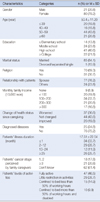Abstract
Purpose
The purpose of this study was to identify nursing needs and burden of family caregivers of middle-aged patients with hepatocellular carcinoma.
Methods
The participants of this study were 101 family caregivers from 3 university hospitals in D city, South Korea. The levels of nursing needs and burden of family caregivers were measured using structured questionnaires from August 1, 2011 to February 29, 2012. The collected data were analyzed using t-tests, ANOVA, Scheffé tests, and Pearson's correlation coefficients.
Results
The greatest nursing need was for information about patients' health status. Among subdomains of burden, financial burden had the greatest mean score. Family caregivers with worsened health status since starting caregiving had significantly higher levels of total nursing needs and total burden. Total burden and physical burden scores showed significant correlations with all subdomains of nursing needs as well as total nursing need scores.
Conclusion
Findings of this study suggest that family caregivers of middle-aged patients with hepatocellular carcinoma need provision of information about patients' health status and treatment plans, and financial support the most. Also maintaining family caregivers' health needs to be considered when providing nursing intervention for patients with hepatocellular carcinoma and their family caregivers.
Figures and Tables
References
1. Hepatoma. National Cancer Information Center Website. Accessed October 30, 2011. http://www.cancer.go.kr/mbs/cancer/jsp/cancer/cancer.jsp?cancerSeq=3317&menuSeq=3318&viewType=all&id=cancer_020105000000.
2. Cancer incidence by age groups. National Cancer Information Center Website. Accessed November 10, 2012. http://www.cancer.go.kr/mbs/cancer/subview.jsp?id=cancer_040103000000.
3. Jung KW, Won YJ, Kong HJ, Oh CM, Lee DH, Lee JS. Cancer statistics in Korea: incidence, mortality, survival, and prevalence in 2011. Cancer Res Treat. 2014; 46:109–123.

4. Causes of death statistics in 2011. Statistics Korea Website. Accessed October 30, 2012. http://meta.narastat.kr/metasvc/index.do?confmNo=10154&inputYear=2011.
6. Jeong KH, Park SY. The effects of family care giving-burden on middleaged people's preparation for old age-the mediating effect of self-efficacy. J Welf Aged. 2014; 63:115–147.
7. Nijboer C, Tempelaar R, Sanderman R, Triemstra M, Spruijt RJ, van den Bos GA. Cancer and caregiving: the impact on the caregiver's health. Psychooncology. 1998; 7:3–13.

8. Schubart JR, Kinzie MB, Farace E. Caring for the brain tumor patient: family caregiver burden and unmet needs. Neuro Oncol. 2008; 10:61–72.

9. Northouse LL, Katapodi MC, Song L, Zhang L, Mood DW. Interventions with family caregivers of cancer patients: meta-analysis of randomized trials. CA Cancer J Clin. 2010; 60:317–339.

10. Kim CG. The needs of family members of cancer patients. Korean J Adult Nurs. 1998; 10:403–413.
11. Lee KC, Chang WC, Chou WC, Su PJ, Hsieh CH, Chen JS, et al. Longitudinal changes and predictors of caregiving burden while providing end-of-life care for terminally ill cancer patients. J Palliat Med. 2013; 16:632–637.

12. Sharpe L, Butow P, Smith C, McConnell D, Clarke S. The relationship between available support, unmet needs and caregiver burden in patients with advanced cancer and their carers. Psychooncology. 2005; 14:102–114.

13. Chung BY, Kim KH. Nursing needs and family burdens of caregivers who have had terminal cancer patients. J Kyungpook Nurs Sci. 2003; 7:63–82.
14. Kim YH, Jeung EO, Cho YR, Yang YO. Discharge education and educational demands after hospital discharge for mothers of pediatric cancer patients. J Korean Acad Child Health Nurs. 2006; 12:268–276.
15. Ham DO. A study family functions and nursing needs in cancer patient families [Master's thesis]. Seoul: Chung-Ang Univ.;2004.
16. Suh MH, Oh KS. A study of well-being in caregivers caring for chronically ill family members. J Nurs Acad Soc. 1993; 23:467–486.

17. Bee PE, Barnes P, Luker KA. A systematic review of informal caregivers' needs in providing home-based end-of-life care to people with cancer. J Clin Nurs. 2009; 18(10):1379–1393.

18. Han YR. Relationship among family primary caregiver characteristics, burden with hospice care and quality of life [Master's thesis]. Daejeon: Chungnam Univ.;2010.
19. Hwang JG, Kim YH. Family support perceived by cancer patients, family caregivers'burden and physical & psychological health. J Fam Relat. 2005; 10:173–198.
20. Nijboer C, Triemstra M, Tempelaar R, Sanderman R, van den Bos GA. Determinants of caregiving experiences and mental health of partners of cancer patients. Cancer. 1999; 86:577–588.

21. Cho EJ, Oh KO. Burden and social support of informal caregivers for cancer patients in postoperative state. J Korean Acad Psychiatr Ment Health Nurs. 2008; 17:10–18.
22. Mosher CE, Bakas T, Champion VL. Physical health, mental health, and life changes among family caregivers of patients with lung cancer. Oncol Nurs Forum. 2013; 40(1):53–61.

23. Carney S, Koetters T, Cho M, West C, Paul SM, Dunn L, et al. Differences in sleep disturbance parameters between oncology outpatients and their family caregivers. J Clin Oncol. 2011; 29(8):1001–1006.

24. Dhruva A, Lee K, Paul SM, West C, Dunn L, Dodd M, et al. Sleep-wake circadian activity rhythms and fatigue in family caregivers of oncology patients. Cancer Nurs. 2012; 35(1):70–81.

25. Ahn EJ, Lee YS. Burnout and burden of family care-givers for caring of terminal patients with cancer. J Korean Oncol Nurs. 2005; 5:40–51.




 PDF
PDF ePub
ePub Citation
Citation Print
Print







 XML Download
XML Download